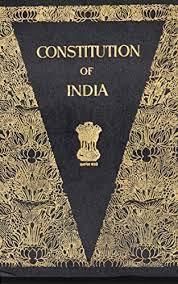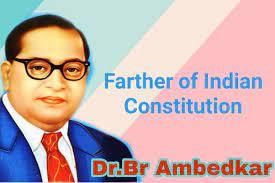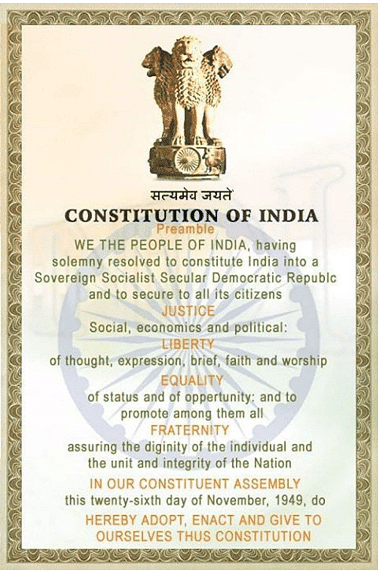Constitution of India | General Knowledge Encyclopedia - Class 8 PDF Download
What is the Constitution of India?
 The Constitution of India is a crucial document that outlines the political principles, government powers, and citizen rights of the country. It serves as the highest law in India and guides the Prime Minister, cabinet ministers, and courts in governing the nation.
The Constitution of India is a crucial document that outlines the political principles, government powers, and citizen rights of the country. It serves as the highest law in India and guides the Prime Minister, cabinet ministers, and courts in governing the nation. - India is declared a sovereign, socialist, secular, democratic republic, with a commitment to ensuring justice, equality, and liberty for all citizens while fostering fraternity among them. The initial draft of the Constitution was prepared by B.N. Rau, the appointed Constitutional Adviser to the Constituent Assembly.
- Before coming under British rule, India was a collection of princely states, each with its own laws based on different religions, philosophies, and artistic concepts. When the British took control, they imposed their own rules and government structure on colonial India, resembling their own system.
- The leaders of independent India recognized the importance of considering the country's diversity while creating the new legal framework. They adapted the existing British model of government to establish a fresh structure that addressed the specific needs of India's diverse communities.
It defines outlines for the following:
- Fundamental political principles.
- Establishes the structure, procedure, powers and duties of government institutions.
- It sets out the fundamental rights, directive principles and the duties of citizens.
Who wrote the Constitution of India?

Dr. Bhimrao Ambedkar was entrusted with the responsibility of drafting the constitution. While drawing inspiration from the British Constitution, he tailored it to befit the requirements of a developing nation with a significantly larger population and diverse minorities. The framers took all these factors into careful consideration to create the new constitution.
What is the preamble to the Constitution of India?

The Preamble to the Constitution of India is a brief introductory statement that sets out the guiding purpose and principles of the document and it indicates the source from which the document derives its authority, which is, the people.
There was a vision for the citizens of free India, an idea or plan for what values the new nation would be built on. This is brought out in the preamble, the introduction to the constitution so to speak.
It states that,
“We, the people of India, having solemnly resolved to constitute India into a sovereign socialist secular democratic republic and to secure to all its citizens:
Justice, social, economic and political;
Liberty, of thought, expression, belief, faith and worship;
Equality of status and of opportunity;
And to promote among them all
Fraternity assuring the dignity of the individual and the unity and integrity of the nation;
In our constituent assembly this twenty-sixth day of November, 1949, do hereby adopt, enact and give to ourselves this constitution.”
The first line of the Indian Constitution
“We, the people of India, having solemnly resolved to constitute India into a sovereign socialist secular democratic republic and to secure to all its citizens.”
It is a declaration that the people of India have defined themselves as free people (sovereign). That there is social and economic equality in this state and there will be no discrimination based on caste or gender. Everyone has equal rights and opportunities to get jobs and earn their livelihood. For example, the government has started a rural employment scheme (socialist).
The government will not favour any one religion (secular). India will never be defined as a Hindu state, even though there is a majority of Hindus in the country. The government will respect the presence of Muslims, Sikhs, Christians and any other religion that someone chooses to follow.
All citizens are able and allowed to be part of the government and this person must be elected including the head of the state like the president (republic).
The government will be formed of the leaders elected by the people from each region or constituency and every citizen above 18 is eligible to vote barring none (democratic). India has 546 constituencies, therefore 546 leaders in the parliament.
Who is the constitutional head of the Constitution of India?
The constitutional head of the Executive of the Union, is the President of India. As per Article 79 of the Constitution of India, the council of the Parliament of the Union consists of two houses, known as the Council of States, the Rajya Sabha and the House of the People, the Lok Sabha.
Article 74(1) of the Constitution provides that there shall be a Council of Ministers with the Prime Minister as its head to aid and advise the President, who shall exercise his/her functions in accordance to the advice. The real executive power is thus vested in the Council of Ministers with the Prime Minister as its head.
What are the unique features of the Constitution of India?
- The Constitution of India is the longest written constitution of any country in the world.
- The Parliament cannot override it because the Constitution was created by a special Constituent Assembly.
- The Constitution provides for a Parliamentary form of government which is federal in structure with the unitary(centralised) features.
What are the unitary features of the Constitution of India?
The Unitary features of the Constitution of India are:
- Strong Centre
- States are not Indestructible
- Single Constitution
- Flexibility of the Constitution
- No Equality of State Representation
- Emergency Provisions
- Single Citizenship
- Integrated Judiciary
- All India Services
- Integrated Audit Machinery
- Parliaments Authority Over State List
- Appointment of Governer
- Integrated Election Machinery
- Veto Over State Bills
What are amendments in a Constitution?
Constitutional Amendment is a modification of the constitution of a nation or the state.
How many Amendments are there in Indian constitution?
There are 122 Amendments Bills and 101 Amendment Acts to the Constitution of India, since it was first enacted in 1950.
The amendments can be effected by the Parliament of India by a prescribed special majority. The other type of amendments includes those that require, in addition to a special majority, ratification by atleast one half of the State Legislatures.
When was the Constitution of India adopted?
After the end of British rule in India, in 1947, the Constituent Assembly adopted the Constitution on 26 November, 1949. It came into effect on 26 January, 1950. With its adoption, the Union of India became Republic of India, replacing the Government of India Act, 1935, as the country’s fundamental governing document. We celebrate Republic Day to commemorate the Constitution of India, on January 26 every year.
|
30 videos|108 docs|27 tests
|
















